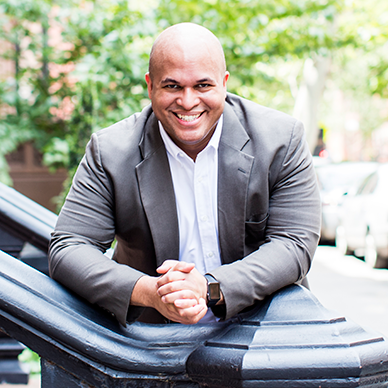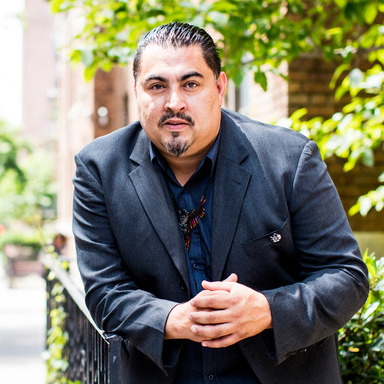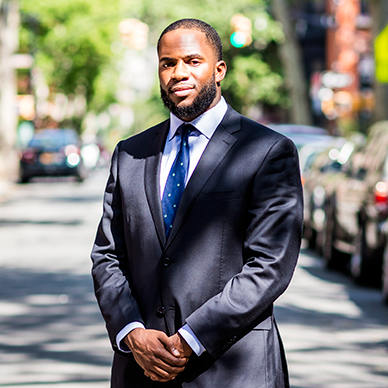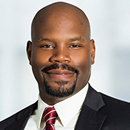Update: Applications for the 2018 Bridge Fellowship are open now through September 2nd.
In February we put out an open call for bold leaders with new ideas to dramatically improve outcomes and school experiences for African-American and Latino young men. With the Bridge Fellowship, we sought folks with a history of advancing big ideas in their field—whether or not that field is education—and who identify with the experiences of students in communities we serve. What followed was more than 400 applications from across the country.
It’s cliché to say we were blown away by almost every application, but it’s true. Sifting through personal essays and project proposals, we were inspired; our belief in our mission to give all kids equal educational opportunities was reaffirmed, and we were truly moved by the passion each applicant has to make a difference in the lives of young men.
Today, we’re thrilled to announce the three 2016 Bridge Fellows: Zaitrarrio Collier, Marvin Pierre, and César A. Cruz. Over the coming weeks on the blog, we will give you a chance to get know each a little better. But in the meantime, here’s an introduction to who they are and what they hope to accomplish:
 Zaitrarrio Collier, Austin, Texas
Zaitrarrio Collier, Austin, Texas
As an engineering student in college, Zaitrarrio became aware of what he calls “a great flaw” in engineering education: At many levels, the curriculum was designed to weed students out of the field rather than encourage them to continue. Zaitrarrio realized this had a particularly negative impact on his fellow African American and Latino classmates. Since then, he has been on a mission to make math, science, and engineering more relevant and engaging for students—particularly students of color who are vastly underrepresented in STEM fields. To date he has helped launch 10 non-profits and startups, including a multimedia educational platform featuring a multicultural cast of video game characters to help elementary students learn algebra. Currently, he is the founder of a non-profit that seeks to increase engagement in STEM through aviation. (Did we mention he’s also an airplane pilot?)
Zaitrarrio will use his fellowship to create a program to give students hands-on learning experiences to help them access tech skills and knowledge, with the goal of increasing the retention rate for African American and Latino young men in high-tech workforce prep programs. Ultimately, Zaitrarrio aims to close the gap between these students and the increasing technological needs employers require from a modern workforce.
 César A. Cruz, Oakland, California
César A. Cruz, Oakland, California
Born in Mexico, César migrated to the U.S. at a young age with his mother and grandmother. He grew up in South Central Los Angeles and has been an educator for close to 20 years, serving most recently as a high school dean. For the last four years, he has overseen a non-profit serving young people affected by or involved in gang activity in Oakland. He is the author of two books and recently received his doctorate in Educational Leadership from the Harvard Graduate School of Education. He is also a proud husband and father of three.
During his fellowship, César seeks to challenge labels commonly ascribed to African American and Latino youth—terms like “at-risk,” “under-privileged,” “in need of remediation”—by attempting to answer two questions: How does how we see, label, and think of young men of color affect our approach to supporting them? And what can these boys teach us about what they need to thrive academically?
César envisions an alternative educational community center to nurture students struggling in school, recent drop-outs, gang members, or young men trying to re-enter society post-incarceration. This community will also include teachers and those working in schools who are looking for a learning environment focused on youth development, African American and Latino Studies, and community engagement. It is César’s hope that including both parties—students and educators—at the table will ensure young men are not simply receivers of knowledge, but also valued experts.
 Marvin Pierre, Houston, Texas
Marvin Pierre, Houston, Texas
Marvin Pierre grew up in South Jamaica, Queens, New York. The son of Haitian immigrants, Marvin spent the early part of his life striving toward better circumstances, while his parents shielded his brothers and him from the gun violence and drugs saturating their neighborhood. At a young age, Marvin says he realized that to better his life—and the lives of others—he had to put his hopes in education. Currently, he is an assistant principal at KIPP Polaris Academy for Boys, where he focuses on character development in kids and coaching teachers to create strong relationships with students.
Working with TNTP, Marvin will focus his fellowship on developing an alternative education program that seeks to upend the school-to-prison pipeline by supporting previously incarcerated boys of color as they re-enter school, and curbing unnecessary referrals from schools to the justice system. Marvin believes one of the primary reasons African American and Latino boys and young men struggle to succeed is because of their inability to dream past the models of “success” they see in their communities: entertainers or professional athletes, or paths leading directly to prison or worse. He aims to help vulnerable youth break a self-perpetuating cycle of poverty, hopelessness, and crime through an educational experience centered on intensive academics, cognitive behavioral development, and the skills they need for long-term academic and professional fulfillment.



